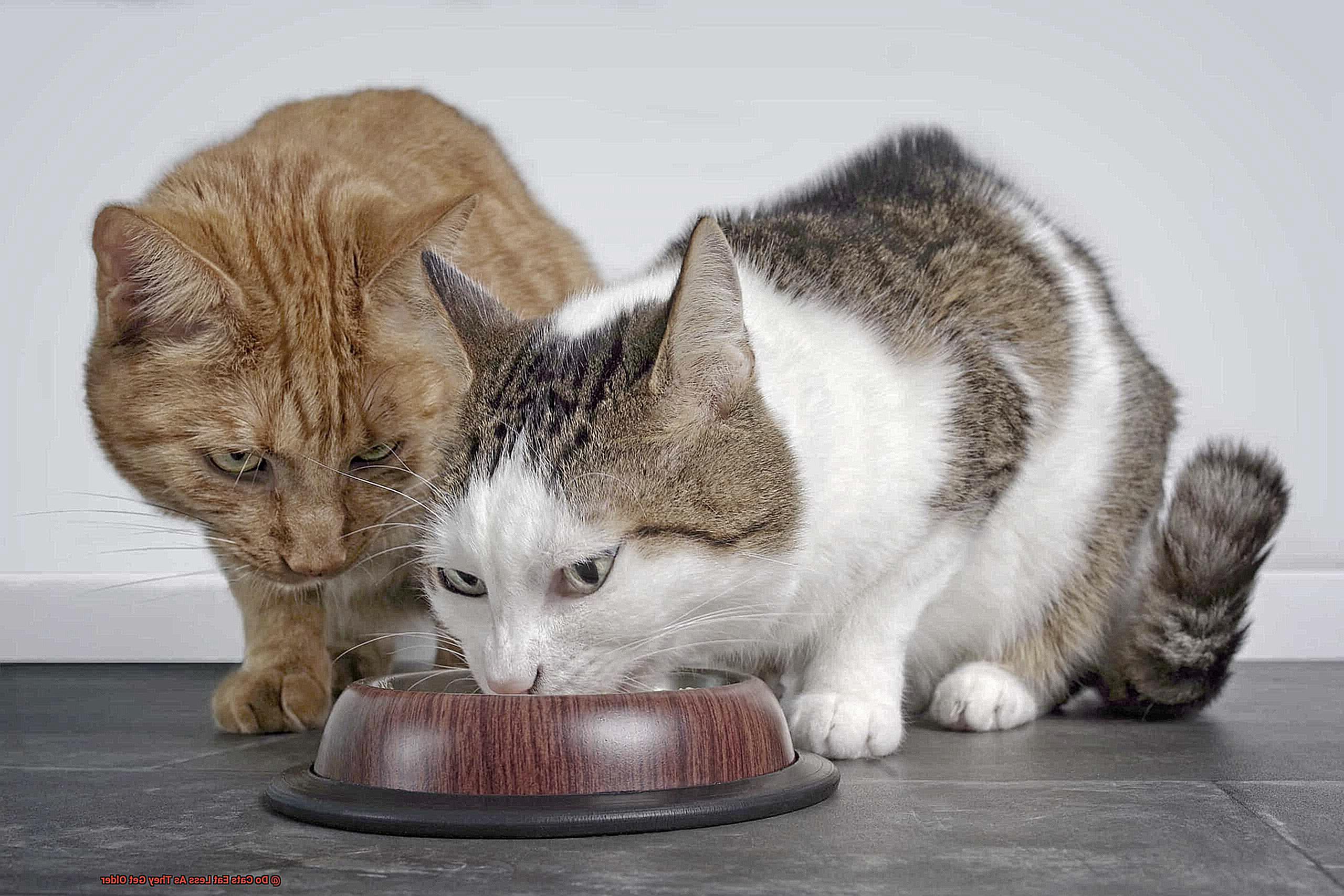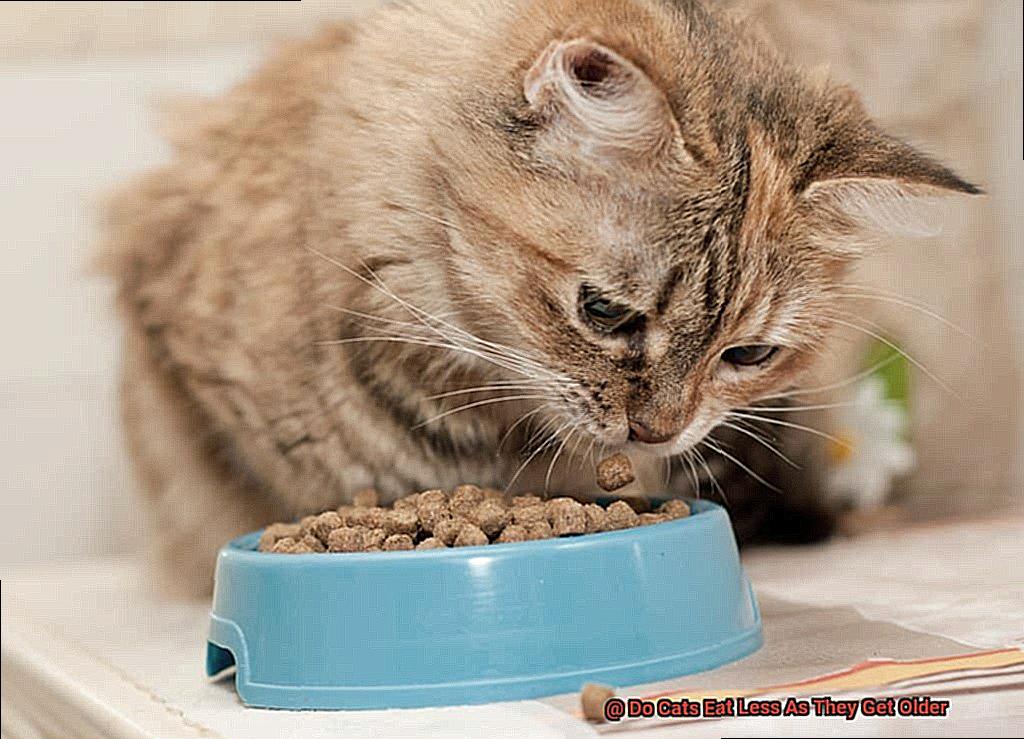Do cats eat less as they age? It’s a question many cat owners ask themselves. As cats get older, their nutritional needs change.
In this blog post, we’ll look at why cats may eat less as they age and what you can do to make sure your senior cat gets the nutrients he or she needs for a happy and healthy life.
We’ll explore how metabolism, appetite, and dental health can all affect your cat’s eating habits.
So if you’re wondering if cats eat less as they get older, read on.
Do Cats Eat Less As They Get Older?
As cats get older, it is natural to assume that their eating habits may change. After all, cats are living creatures, and just like humans, they age and their bodies change over time. So, do cats eat less as they get older? The answer is yes, but not for the reasons you might think.
Cats are obligate carnivores, meaning that they must consume a diet mostly composed of animal-based proteins in order to survive. As cats age, their bodies become less efficient at processing proteins and other nutrients from their food. This means that they need less food to meet their nutritional needs.

Additionally, cats may become less active as they age, which can also contribute to a decrease in appetite.
However, it is important to note that if your cat is eating significantly less than usual, it could be a sign of an underlying medical condition.
If you notice that your cat is eating less than usual or has lost weight, it is important to take them to the vet for a checkup. Your vet can help determine if there is an underlying medical condition or if your cat simply needs a change in diet due to aging.

Overall, cats do tend to eat less as they get older due to changes in their bodies and activity levels.
However, if you notice any drastic changes in your cat’s appetite or weight, it is important to take them to the vet for a checkup.
What Age Do Cats Start Eating Less?
You may have noticed that they are eating less than when they were younger. This is a common occurrence among cats over the age of 7–9.
The causes of this are changes in metabolism, reduced activity levels, and a decrease in appetite. As cats age, their bodies become less efficient at absorbing nutrients from their food. This can lead to them feeling full after eating smaller portions than before.
Additionally, older cats may have difficulty chewing or digesting certain types of food, which can lead to a decreased appetite. Cats may also experience a decrease in activity as they age, which means they don’t need as much food as before.
If your cat is eating less than usual, it’s important to visit your veterinarian for advice on how to care for them during this time.
Why Is My Cat Eating Less But Acting Normal?
Stress, illness, and aging are all potential causes of this behavior.
Stress and anxiety can be triggered by changes in your cat’s environment, such as moving to a new home or the introduction of a new pet. Illness can also be the culprit, with underlying medical conditions such as kidney disease, thyroid disease, cancer, and gastrointestinal issues leading to reduced appetite in cats.
As cats age, their metabolism slows down, and they naturally need less food than before.
It is important to look out for other signs that may indicate an illness in your cat. Weight loss is one of the most common signs that something isn’t right and should be checked out by a vet immediately.
Changes in behavior such as sleeping more or being less active than usual could also point to an underlying health issue. If your cat is vomiting or has diarrhea, this could suggest an illness and should be evaluated by a doctor straight away.
Do Cats Go Through Phases Of Eating Less?
Cats can suffer from periods of reduced appetite due to a variety of issues, such as stress, illness, age, and physical activity level. If your feline friend is consuming less than usual, it’s essential to take them to the vet for a checkup.
It is also important to monitor their eating habits and ensure they are getting enough nutrition. If your cat isn’t eating enough, there are ways you can encourage them to eat more. Adding wet food to their diet is one way to do this, as well as offering treats or different types of food.
If your cat isn’t eating as well as normal, it’s important to be aware and take steps to ensure they get the proper diet they need.
If you have any questions concerning your cat’s well-being or diet, please consult your veterinarian for guidance and advice.
How Much Should An Elderly Cat Eat Per Day?
As cats age, their metabolism slows, and they may need fewer calories than when they were younger. The recommended daily caloric intake for older cats is around 25 calories per pound of body weight. For example, a 10-pound senior cat should consume approximately 250 calories per day.
It’s essential to feed your elderly cat a diet that is rich in protein and low in carbohydrates. This will help them get the energy they need without putting too much strain on their digestive system.
Additionally, senior cats may benefit from omega-3 fatty acids, antioxidants, and vitamin E supplements.
Lastly, it is important to monitor your cat’s weight and adjust its caloric intake if it is gaining or losing too much.
Nutritional Needs Of Senior Cats
As cats age, their nutritional needs change. Senior cats require special dietary habits to stay healthy and happy in their golden years.
When feeding a senior cat, it’s important to provide a diet that is easy to digest and low in calories. Senior cats may need more protein and less fat than younger cats. Make sure your senior cat gets all the essential vitamins, minerals, and fatty acids they need for a balanced diet.
Their metabolism slows down as they age, so consider providing your senior cat with more frequent meals throughout the day. Adding glucosamine or fish oil supplements to their diet can also help support joint health.
Make sure your senior cats are getting the vitamins they need for a long and happy life.
Dental Health And Appetite In Older Cats
As cats age, dental health can have a profound impact on their appetite. Poor dental health can be a source of pain and discomfort when eating, making it difficult for cats to eat. They may also struggle to chew due to their poor dental health. If you notice your cat pawing at their mouth, drooling, having bad breath, or having a loss of appetite, it could be suffering from dental issues.
Regular checkups with the vet and brushing your cat’s teeth are essential for keeping their teeth in good condition and ensuring they maintain a healthy appetite. If your cat is exhibiting signs of dental problems, don’t delay; take them to the vet right away for an accurate diagnosis and treatment.
Tips For Encouraging Your Senior Cat To Eat
It can be difficult to encourage your senior cat to eat, but there are some tips you can use to help get them back on track. Here are 8 ways to encourage your senior cat to eat:
Offer Variety
To keep their interest in eating, try offering different types of food, such as wet food, dry food, and treats. This will help stimulate their appetite and make them more likely to eat.
Make Mealtime Fun
Make mealtime fun for your cat by providing interactive toys or treats that they can play with while they eat. This will help keep their appetite up and make them more likely to eat regularly throughout the day.
Keep Mealtimes Consistent
Keeping mealtimes consistent helps cats establish a routine and makes them more likely to eat at regular intervals each day.
Monitor Portion Size
Make sure you are not overfeeding your cat by monitoring the portion size of their meals and snacks.
Add Nutritional Supplements
Adding nutritional supplements such as omega-3 fatty acids or probiotics can help boost your cat’s appetite and overall health.
Provide Healthy Treats
Instead of giving them high-calorie treats all the time, offer healthy snacks such as cooked chicken, tuna, or salmon in small portions throughout the day.
Increase Activity Level
Increasing your cat’s activity level can help stimulate their appetite and make them more likely to eat regularly throughout the day.
Visit the Vet
If you have any concerns about your cat’s eating habits, it is important to visit the vet for a checkup to rule out any underlying medical issues that may be causing their decreased appetite.
Also Read: Why Is Older Cat Playing Rough With Kitten?
Conclusion
As cats age, their nutritional needs change. They may need fewer calories than when they were younger. It’s important to track their eating habits and make sure they get the right diet.
Decreased appetite in cats can be caused by stress, illness, and aging, so if any of these symptoms appear, have them examined right away.
Additionally, dental hygiene is key for a cat’s appetite; regular vet checkups and brushing your cat’s teeth are essential for keeping their teeth healthy.
To inspire your senior cat to eat, there are several things you can do: introduce variety into their meals, make mealtime fun, monitor portion size, add nutritional supplements, offer healthy snacks, and increase activity levels.







